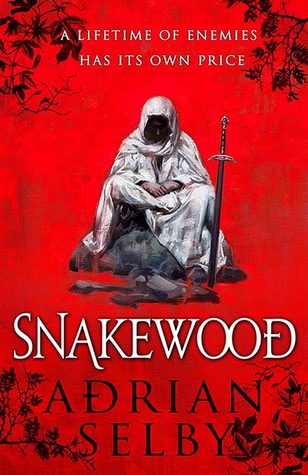 Snakewood by Adrian Selby
Snakewood by Adrian Selby on March 15th 2016
Pages: 432





Once they were a band of mercenaries who shook the pillars of the world through cunning, alchemical brews, and cold steel. Whoever met their price won.
Now, their glory days behind them, scattered to the wind, and their genius leader in hiding, they are being hunted down and eliminated one by one.
A lifetime of enemies has its own price.
Now that description made Snakewood one of my most anticipated reads of 2016. I mean, how could a grimdark fan not love the idea of a story about past their prime mercenaries dealing with unknown enemies who are trying to slaughter them for past wrongs. At least, I couldn’t help myself, so I was overjoyed when I received an advanced reading copy of this one.
And, as promised, this story opens with the surviving members of “Kailen’s Twenty” (a legendary band of mercenaries) discovering they are being hunted down one by one. Why they are being killed is both a mystery to them and to the reader, but one which the author attempts to slowly reveal by adding “historical” chapters regarding the group’s past endeavors — as relayed by different people.
Through this interchange between past and present, the survivors of Kailen’s Twenty come into focus. A reader able to see how they once were and how the years have taken a toll on the testosterone-filled, calculated mercs of the past. Each of them is now scarred, battered, and riddled with faults. Honestly, they are not good people by any stretch of the imagination. Rather, they are real people who have lived a lifetime of war; the end result of that life of fighting, killing, and drugging is a bunch of brokendown, vicious has-beens (well, most of them anyway) who probably deserve to die and die horribly.
The story which organically grows around this less-than-stellar group is basically one of revenge. All the questions, action-packed fight scenes, and battles revolving around who is killing everyone and why. The mystery finally coming to a head at the end of the novel.
Unfortunately, while Snakewood had a great premise, the story just does not deliver for numerous reasons. Let me explain.
One, the first third of the novel was horribly confusing and difficult to comprehend. Immediately, a reader is thrown into the thick of the action without any introduction as to who they are following, why these people are important, or what is actually going on. And the sheer volume of different characters, time periods, and situations never seems to stop changing, as the author constantly shifting the focus of the narrative. All of it combining to make the first third of this novel nearly impossible to follow along with.
Two, these characters are very difficult to empathize with. Everyone portrayed here is really, really grim. I personally have no problem with an author having tough, realistic characters with flaws. However, too many times in Snakewood, the people are only shown as abhorrent. There really doesn’t seem to be anything else to them except for their flaws. No silver lining. No hidden honor. Nothing but cruelty and viciousness. Plus, there was never enough explanation or justification of their behavior to satisfy me. And when there was, it was too little too late or way past the point of mattering because the character had already passed from the stage.
Three, the device of “historical” flashbacks to rehash events from different points of view did nothing but bore me. Personally, I didn’t want to stop the narrative flow to go read about another individual’s take on the same situation or event. Sure, it added new wrinkles to the story, but the benefit did not outweigh the costs in my opinion.
Fourth, I totally understand why the author decided to make the sections “written” by the individuals themselves reflect that persons dialect, grammatical skill, and so forth, but the authenticity factor really did not help the story at all. Honestly, reading a section where the narrator can hardly string sentences together in a coherent manner didn’t help me get into the story as much as it caused me to just either skim or skip their section.
To be fair however, even with its faults, I have to admit Adrian Selby integrated several really cool ideas into the book. The world building was one; this fantasy world featuring lots of differing people and countries; each with its own unique set of issues and strengths vying for power in a world in turmoil. But my favorite feature of Snakewood was the use of “plants” and specifically the brews made from them. The super-human, spectacular abilities given to the combatants here by their different “fightbrews” was really intriguing; the realistic look at the withdrawals they had afterwards was fairly refreshing; and the ordinary use of poisons and such during combat was a very nice touch to liven up the combat in a low level magical world.
As sad as it is for me to admit, Snakewood was a novel which just missed the mark. It had an amazing premise, some really cool ideas regarding combat, and even some interesting world building touches, but the story dragged overall, was difficult to become engaged in, and did not have any characters to empathize with. For those reasons, I can only recommend it to diehard grimdark fans who really enjoy a challenging and grim read.
- Review: Black City Saint by Richard A. Knaak - March 21, 2016
- Review: Snakewood by Adrian Selby - March 11, 2016
- Review: A Song for No Man’s Land by Andy Remic - March 2, 2016


No Comments
Comments are closed.